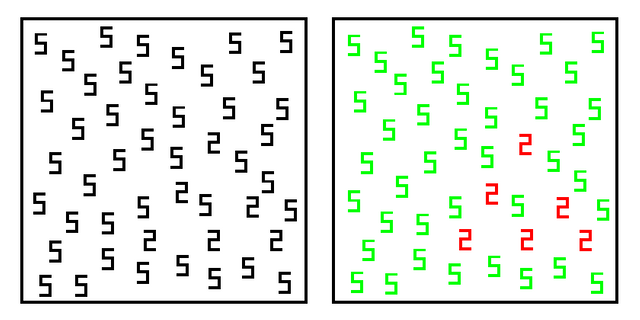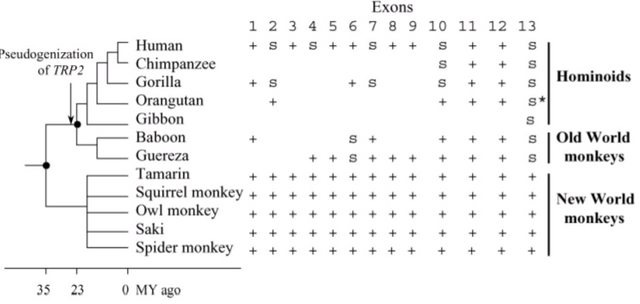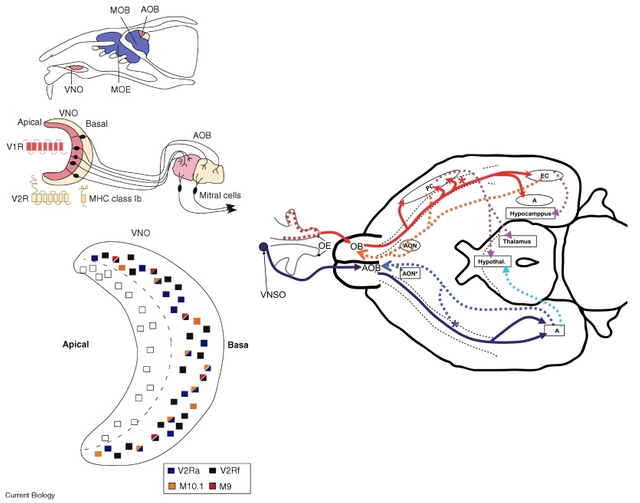Pheromones: Perception and Response
TL;DR There are two main known routes of pheromones perception. Pheromones seem to select gender specific violent or mating behavior after arousal in animals with underdeveloped color vision by the accessory route, through inhibition of hypersexual behavior. Anosmia through the main route predisposes to low or absent displays of sexual behavior.
How does instinct and violent behavior work
In many species, specific behaviors are similar despite isolation and upbringing. A clear example of this is, for instance, birds nest construction and Spiderwebs. Highly complex patterns of behavior for the species, that they don't seem to require communal learning to perform.
Fighting behavior and maternal behavior to a big degree is highly reproducible among the members of a given species.
Behavior normally don't appear without a cue, something that triggers a specific response. That most likely is genetically ingrained. Thus senses appear to held the clue for advanced behavior.
Senses transduce the signals of the environment into something the central nervous system of animals can interpret.

In the case of human's a shown by synesthesia.[1] Perception and detection are not the same thing. For instance, a task like localizing particular numbers in numbers with similar symmetry is a task that is immediate to people with a particular case of synesthesia for numbers. Giving them orders of magnitude more speed and precision.
In the case of smell, the primary event of olfactory perception occurs in a type of bipolar neurons located in the olfactory epithelium. The structure the end is called the olfactory knob, where the signal is transduced and projected into the brain.
Some signals are combinations of simple structures, like the molecules perceived by exposition to foods. In the case of pheromones, they are highly specific for the species. It provides sexual and genetic identity to the animal being perceived.[2]
The case of rodents
Smell plays an important role in the case of kin and fitness detection in rodents. Where hierarchy and category need to be signaled.
Odorants are detected in the nasal cavity, the olfactory epitheleum. Each population of neurons represents a different olfactory recpetor gene. Thus they can recognize diferent subsets of odorant signals [3]
The detection of pheromones seems to occur in a different place, called the vemoronasal organ. Localized in the septum of the nose. It has a tubular structure, so the pheromones come into contact with the liquid filled lumen that takes this non-volatile molecules to be transduced by the specific neurons that have the particular family of receptors V1R[4] and V2R.[5] These receptors use an specific chanel of transduction the TRPC2 channel, the receptors project to the accesory olfactory bulb.
The projections to the central nervous system, from both systems appear to be different. In the case of the accesory olfactory bulb it's conections to the hypotalamus seem to contact centers specialized for agression and sexual behavior.
If there's an alteration in the signal for TRPC2, like TRPC2 knockout rats. The male rodents will be unable to differentiate between female and male, trying to mate with both genders.[6]
The default option is mating behavior. Trigering of mating behavior can be initiated by routes alternate to the vomeronasal organ input. The function of pheromones seems to be gender identification.
The genes for specific gender behavior can be seen in the Drosophila Fruitless gene (fru).[7] where females with clusters of masculinized neurons can start male courship behavior.
This perception can be trigered by visual routes like in the case of the Shell parakeets, where a blue dot in the beak identifies a male. If one is painted on a female, males will atack it. If a male has the blue removed, other males will try to mate with it.[8]

The TRP2 gene is non-functional in higher primates, including humans. When looking at the gene history it seems the mutations that rendered the homologous genes nonfunctional appeared at a similar time a new class of opsins appeared in new world primates. That allowed for red and green discrimination.[9] which hints to a more relaxed sexual discrimination in the case of primates.[10]
By tracing the neural pathways in the rodent brain one can find the role of smell in sexual development. The LHRH neurons are crucial in sexual maturity and correct function of sexual caracteristics. By emplying a method for synapsis tracement, using rabies pseudovirus, one can select a particular route of LHRH::CRE expressing neurons and the virus infects them, showing which neurons are conected. [11] It shows that the accesory system is not directly conected to it. The main olfactory route is directly conected to it and animals with low olfactory function, like males with non-functional olfactory cyclic nucleotide chanel are unable to mate.
The sex specificity of hormone perception, seems to indicate that at least in mice the vomeronasal organ supresess hypersexual behavior in females and selects for agressive behavior in males. [12] This is independent of hormonal levels.
This leads to an interesting theory of a brain model where switch meachanisms for sexual behavior, from environmental cues in a potential female/male behavior is the norm. [13]



As Rick Sanchez once quoted:
"Love is nothing but a chemical reaction that compels animals to breed. It hits hard, Morty, then it slowly fades, leaving you stranded in a failing marriage. I did it. Your parents are gonna do it. Break the cycle, Morty. Rise above. Focus on science."
Great post :)
Ertwro, the only guy on steemit to properly reference his shit
Yep, he really puts in the extra effort to do a great job.
Other
Hold
These receptors use a specific channel of transduction called the TRPC2 channel. TRPC2 projects to the accessory olfactory bulb.
differentiate, female
#editing
Thanks, for the proofreading. I'm embarrassed I missed so many things.
I miss even more in my own posts :p
So I can't criticize, just making it read a little smoother for people.
That's why I love the #steemstem community.
Slowly it grows, and with some really nice people. :)
Wow, Pheromones of Love! poison also contains pheromones...
Great post, very intersting! I've always found it fascinating how some animals don't even need to learn how to do such complex things like building a nest or spiderweb, amazing!
Thanks, glad you enjoyed.
Stay conscious, ask questions, safety =/= comfort. thanks for this, made me think about situations in my life that had me wracking my brain and body, yet i never stopped to think "why?". Furthermore, never stepped back to accept that there was something outside of my perception that was compelling my behaviour!
On the off chance that a male has the blue evacuated, ohter guys will endeavor to mate with it.
Other
In this manner faculties seem to held the hint for cutting edge conduct.
Hold
that utilization a particular chanel of transduction the TRPC2 channel which venture to the Accesory olfactory knob.
These receptors utilize a particular channel of transduction called the TRPC2 channel. TRPC2 tasks to the frill olfactory globule.
rodents will be not able differentite amongst famale and male, attempting to mate with the two sexual orientations.
This post was well articulated with clear reference to the source. I see this post as psychological in nature,thump up for you
nice blog and such blog is important to learn everything